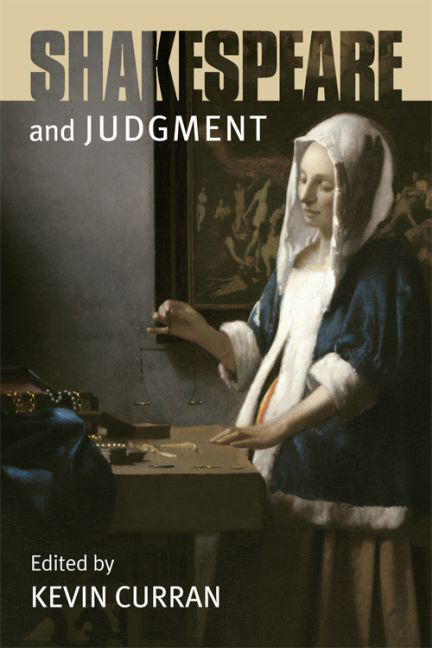Book contents
- Frontmatter
- Contents
- Acknowledgments
- List of Contributors
- Introduction
- Part I Staging Judgment: Deliberation in the Plays
- Part II Audience Judgment: Deliberation in the Theater
- Part III The Ethics of Judgment
- 8 Antinomian Shakespeare: English Drama and Confession Across the Reformation Divide
- 9 Bracketed Judgment, “Un-humanizing,” and Conversion in The Merchant of Venice
- 10 The Judgment of the Critics that Makes us Tremble: “Distributing Complicities” in Recent Criticism of King Lear
- Index
8 - Antinomian Shakespeare: English Drama and Confession Across the Reformation Divide
from Part III - The Ethics of Judgment
Published online by Cambridge University Press: 10 May 2017
- Frontmatter
- Contents
- Acknowledgments
- List of Contributors
- Introduction
- Part I Staging Judgment: Deliberation in the Plays
- Part II Audience Judgment: Deliberation in the Theater
- Part III The Ethics of Judgment
- 8 Antinomian Shakespeare: English Drama and Confession Across the Reformation Divide
- 9 Bracketed Judgment, “Un-humanizing,” and Conversion in The Merchant of Venice
- 10 The Judgment of the Critics that Makes us Tremble: “Distributing Complicities” in Recent Criticism of King Lear
- Index
Summary
On St. Stephen's Day in 1604 the King's Men performed at court a play about a duke who retreats from the strain of his own misrule to visit a friary in secret. For years, he confides to his confessor there, he has neglected to enforce the law and quietly tolerated all manner of transgression. Justice of the talionic kind that supplies the play with its title – eye for an eye, measure for measure – had once been able to dissuade malefactors by threatening the most unforgiving retaliation, but now, with de facto grants of immunity grown so customary, his empty fulminations no longer curb the least illicit impulse. On the contrary they inspire open mockery, as though tit-for-tat requital were a farcical joke played on true discipline, a comedy in which “Liberty plucks Justice by the nose” to unrestrained laughter. Such uninhibited freedom has led to an upside-down state of anarchy, not unlike the carnivalesque atmosphere on St. Stephen's but otherwise at odds with normative convention: “the baby beats the nurse,” complains the duke, “and quite athwart / Goes all decorum” (1.3.30–1). Worse still, according to him, the current chaos is wholly his fault; by giving the people scope to offend, he has actively suborned their moral abandon: “for we bid this be done,” he explains, “[w]hen evil deeds have their permissive pass, and not the punishment” (1.3.37–8).
This private exchange between Duke Vincentio and Friar Thomas provides Measure for Measure with its backstory in more than one sense: we glimpse here the fictional events that precede the action onstage as well as the actual history from which the play as a whole draws its urgency and aura of relevance. At the most topical level is its holiday performance (the first recorded) before a king who had likewise admitted to an excess of leniency during an earlier phase of his rule: “For I confesse,” he writes, “where I thought (by being gracious at the beginning) to win all mens heartes to a louing and willing obedience, I by the contrarie founde, the disorder of the countrie.”
- Type
- Chapter
- Information
- Shakespeare and Judgment , pp. 175 - 194Publisher: Edinburgh University PressPrint publication year: 2017

